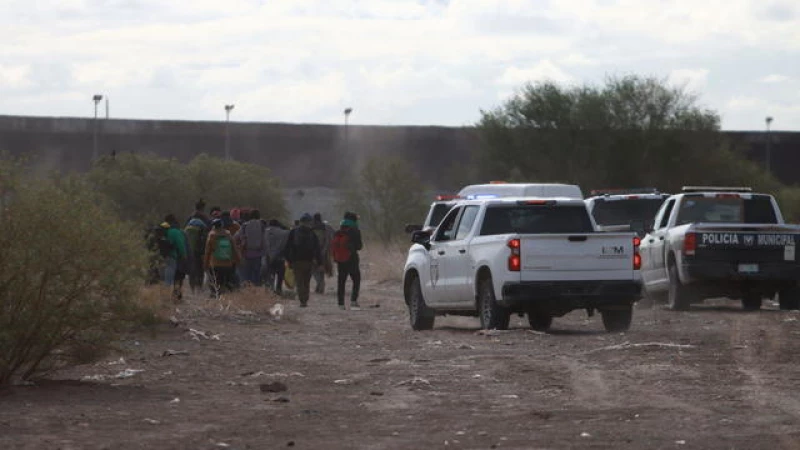Washington — Recent data reveals a decline in the number of migrants apprehended along the U.S.-Mexico border in March. This unexpected trend is attributed to an immigration crackdown by the Mexican government, according to internal government statistics obtained by CBS News.
Border Patrol agents detained more than 137,000 migrants who crossed the U.S. southern border unlawfully last month, a decrease from the nearly 141,000 apprehended in February. These figures, based on preliminary Customs and Border Protection data, were confirmed by three U.S. officials.
For the first time in seven years, and the sole instance during the Biden administration, illegal crossings along the U.S.-Mexico border did not see an increase from February to March, as indicated by historical CBP statistics. In the past three years, there has been a significant increase in illegal crossings during this period, with at least 33,000 additional apprehensions.
An additional 52,000 migrants were processed at legal border crossings in March, with many of them utilizing a Biden administration process that allows prospective asylum-seekers in Mexico to enter the U.S. after securing an appointment through a smartphone app.
Officials are still anticipating an uptick in migration during the spring, as has been the historical trend. However, the lower-than-expected number of illegal crossings in March comes as a relief for the Biden administration, which has been grappling with an unprecedented humanitarian crisis and political backlash due to the surge in migrants crossing the southern border.
Identifying a single reason for the decline in migrant crossings is challenging, given the complexity of migration influenced by various factors like American policies, tactics employed by smugglers, and conditions in migrants' home countries.
According to three U.S. officials, Mexico's increased efforts to curb U.S.-bound migration have significantly contributed to the decrease in unlawful crossings reported by American authorities. In response to the record-high migrant numbers in December, the Biden administration sent senior officials to Mexico City to urge Mexican authorities to take action to reduce migrant arrivals near the U.S. border.
A senior CBP official, speaking on the condition of anonymity, mentioned that Mexico has deployed additional personnel to hinder migrants from reaching the American border through freight trains or buses. Additionally, Mexican officials are deporting some intercepted migrants further south, as per the CBP official.
The decline in illegal crossings in March was particularly notable among non-Mexican migrants, who can be detained by Mexican authorities from moving within Mexico.
"One of the reasons for the decrease was the government of Mexico's continued significant enforcement efforts to disrupt some of the transportation networks moving people up to the border," the official said.
Beyond Mexico's actions, American officials also attributed the downtick in migrant crossings to increased deportations by the U.S.
Since May, the U.S. has deported or returned more than 630,000 migrants, including nearly 100,000 parents and children traveling as families, to Mexico or their home countries, according to Department of Homeland Security data. In one week in March, the U.S. conducted 39 deportation flights, the senior CBP official told CBS News, calling the number a record.
In March, the busiest sectors for illegal crossings continued to be the areas near San Diego and Tucson. Texas Gov. Greg Abbott, one of the most outspoken Republican critics of the Biden administration's immigration policies, has taken credit for illegal crossings concentrating in Arizona and California in recent months, citing his efforts to fortify the banks of the Rio Grande with razor wire and other barriers.
In a recent interview with CBS News, U.S. Border Patrol chief Jason Owens said that while Texas' actions may be having "some impact" in deterring migrants, they were not the "one panacea." Mexico's actions are also playing a role, he said.
In a statement, CBP spokeswoman Erin Waters said the Biden administration would continue to work with other countries, including Mexico, to combat the criminal groups smuggling migrants into the U.S.
Still, Waters added, "CBP remains vigilant to continually shifting migration patterns and will adjust operations as necessary. The fact remains that we continue to experience serious challenges along our border; we need Congress to take action and provide additional resources and tools to address them."
Ariel Ruiz, an analyst at the Washington-based Migration Policy Institute, said relying on Mexican immigration enforcement is not a durable solution for the U.S. Ruiz said the Mexican government's actions are creating a "bottleneck" of migrants in Mexico, since it cannot deport most migrants to other countries.
"It's delicate because it's building pressures inside of Mexico," Ruiz said. " And the moment that Mexican enforcement cannot keep up with those actions or say there's a change in administrations in Mexico's elections coming up in June, there may be pressures that push those migrants to go ahead and come to the United States."
President Biden has been contemplating the tightening of asylum rules at the southern border by utilizing a broad presidential power that was previously used by his predecessor, former President Donald Trump, to limit legal immigration and asylum. Despite this, administration officials have emphasized that any executive action taken would not negate the necessity for Congress to revamp an overwhelmed immigration system that has not been updated since the 1990s.
A senior CBP official mentioned that "there is no magical solution that can be achieved through executive action."







